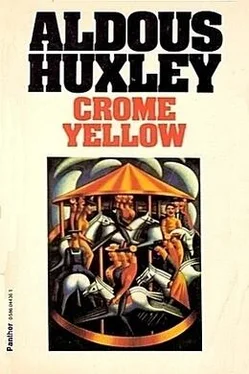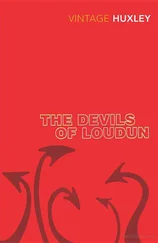"Mr. Stone is one of our younger poets." It was Anne's voice. He scowled at her, and she smiled back exasperatingly.
"Excellent, excellent," said Mr. Barbecue–Smith, and he squeezed Denis's arm encouragingly. "The Bard's is a noble calling."
As soon as tea was over Mr. Barbecue–Smith excused himself; he had to do some writing before dinner. Priscilla quite understood. The prophet retired to his chamber.
Mr. Barbecue–Smith came down to the drawing–room at ten to eight. He was in a good humour, and, as he descended the stairs, he smiled to himself and rubbed his large white hands together. In the drawing–room someone was playing softly and ramblingly on the piano. He wondered who it could be. One of the young ladies, perhaps. But no, it was only Denis, who got up hurriedly and with some embarrassment as he came into the room.
"Do go on, do go on," said Mr. Barbecue–Smith. "I am very fond of music."
"Then I couldn't possibly go on," Denis replied. "I only make noises."
There was a silence. Mr. Barbecue–Smith stood with his back to the hearth, warming himself at the memory of last winter's fires. He could not control his interior satisfaction, but still went on smiling to himself. At last he turned to Denis.
"You write," he asked, "don't you?"
"Well, yes—a little, you know."
"How many words do you find you can write in an hour?"
"I don't think I've ever counted."
"Oh, you ought to, you ought to. It's most important."
Denis exercised his memory. "When I'm in good form," he said, "I fancy I do a twelve–hundred–word review in about four hours. But sometimes it takes me much longer."
Mr. Barbecue–Smith nodded. "Yes, three hundred words an hour at your best." He walked out into the middle of the room, turned round on his heels, and confronted Denis again. "Guess how many words I wrote this evening between five and half–past seven."
"I can't imagine."
"No, but you must guess. Between five and half–past seven—that's two and a half hours."
"Twelve hundred words," Denis hazarded.
"No, no, no." Mr. Barbecue–Smith's expanded face shone with gaiety. "Try again."
"Fifteen hundred."
"No."
"I give it up," said Denis. He found he couldn't summon up much interest in Mr. Barbecue–Smith's writing.
"Well, I'll tell you. Three thousand eight hundred."
Denis opened his eyes. "You must get a lot done in a day," he said.
Mr. Barbecue–Smith suddenly became extremely confidential. He pulled up a stool to the side of Denis's arm–chair, sat down in it, and began to talk softly and rapidly.
"Listen to me," he said, laying his hand on Denis's sleeve. "You want to make your living by writing; you're young, you're inexperienced. Let me give you a little sound advice."
What was the fellow going to do? Denis wondered: give him an introduction to the editor of "John o' London's Weekly", or tell him where he could sell a light middle for seven guineas? Mr. Barbecue–Smith patted his arm several times and went on.
"The secret of writing," he said, breathing it into the young man's ear—"the secret of writing is Inspiration."
Denis looked at him in astonishment.
"Inspiration…" Mr. Barbecue–Smith repeated.
"You mean the native wood–note business?"
Mr. Barbecue–Smith nodded.
"Oh, then I entirely agree with you," said Denis. "But what if one hasn't got Inspiration?"
"That was precisely the question I was waiting for," said Mr. Barbecue–Smith. "You ask me what one should do if one hasn't got Inspiration. I answer: you have Inspiration; everyone has Inspiration. It's simply a question of getting it to function."
The clock struck eight. There was no sign of any of the other guests; everybody was always late at Crome. Mr. Barbecue–Smith went on.
"That's my secret," he said. "I give it you freely." (Denis made a suitably grateful murmur and grimace.) "I'll help you to find your Inspiration, because I don't like to see a nice, steady young man like you exhausting his vitality and wasting the best years of his life in a grinding intellectual labour that could be completely obviated by Inspiration. I did it myself, so I know what it's like. Up till the time I was thirty–eight I was a writer like you—a writer without Inspiration. All I wrote I squeezed out of myself by sheer hard work. Why, in those days I was never able to do more than six–fifty words an hour, and what's more, I often didn't sell what I wrote." He sighed. "We artists," he said parenthetically, "we intellectuals aren't much appreciated here in England." Denis wondered if there was any method, consistent, of course, with politeness, by which he could dissociate himself from Mr. Barbecue–Smith's "we." There was none; and besides, it was too late now, for Mr. Barbecue–Smith was once more pursuing the tenor of his discourse.
"At thirty–eight I was a poor, struggling, tired, overworked, unknown journalist. Now, at fifty…" He paused modestly and made a little gesture, moving his fat hands outwards, away from one another, and expanding his fingers as though in demonstration. He was exhibiting himself. Denis thought of that advertisement of Nestle's milk—the two cats on the wall, under the moon, one black and thin, the other white, sleek, and fat. Before Inspiration and after.
"Inspiration has made the difference," said Mr. Barbecue–Smith solemnly. "It came quite suddenly—like a gentle dew from heaven." He lifted his hand and let it fall back on to his knee to indicate the descent of the dew. "It was one evening. I was writing my first little book about the Conduct of Life—'Humble Heroisms'. You may have read it; it has been a comfort—at least I hope and think so—a comfort to many thousands. I was in the middle of the second chapter, and I was stuck. Fatigue, overwork—I had only written a hundred words in the last hour, and I could get no further. I sat biting the end of my pen and looking at the electric light, which hung above my table, a little above and in front of me." He indicated the position of the lamp with elaborate care. "Have you ever looked at a bright light intently for a long time?" he asked, turning to Denis. Denis didn't think he had. "You can hypnotise yourself that way," Mr. Barbecue–Smith went on.
The gong sounded in a terrific crescendo from the hall. Still no sign of the others. Denis was horribly hungry.
"That's what happened to me," said Mr. Barbecue–Smith. "I was hypnotised. I lost consciousness like that." He snapped his fingers. "When I came to, I found that it was past midnight, and I had written four thousand words. Four thousand," he repeated, opening his mouth very wide on the "ou" of thousand. "Inspiration had come to me."
"What a very extraordinary thing," said Denis.
"I was afraid of it at first. It didn't seem to me natural. I didn't feel, somehow, that it was quite right, quite fair, I might almost say, to produce a literary composition unconsciously. Besides, I was afraid I might have written nonsense."
"And had you written nonsense?" Denis asked.
"Certainly not," Mr. Barbecue–Smith replied, with a trace of annoyance. "Certainly not. It was admirable. Just a few spelling mistakes and slips, such as there generally are in automatic writing. But the style, the thought—all the essentials were admirable. After that, Inspiration came to me regularly. I wrote the whole of 'Humble Heroisms' like that. It was a great success, and so has everything been that I have written since." He leaned forward and jabbed at Denis with his finger. "That's my secret," he said, "and that's how you could write too, if you tried—without effort, fluently, well."
"But how?" asked Denis, trying not to show how deeply he had been insulted by that final "well."
"By cultivating your Inspiration, by getting into touch with your Subconscious. Have you ever read my little book, 'Pipe–Lines to the Infinite'?"
Читать дальше











